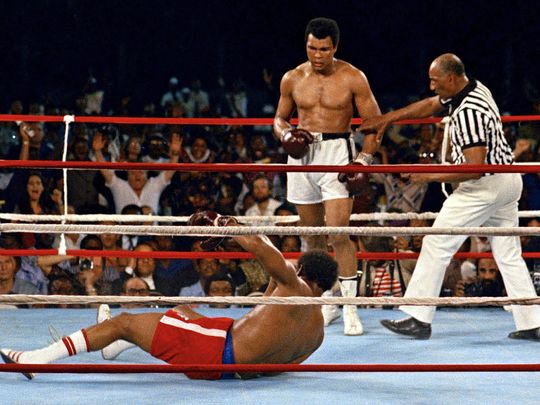Nonprofit Arts Organizations Without Flexibility Present a Disconnect When It Really Matters
On September 12, 2001, we issued an internal memo at our nonprofit arts organization. We proffered the notion that standing by our programming and “moving forward” was the best way to fight back.
We were wrong. Putting on blinkers never helps.
On June 12, 2016, after one attack in Orlando and a foiled one in Santa Monica – key nonprofit arts organizations are right now readying memos rationalizing the same advice.
Move forward. That’ll show ‘em.
At what tipping point do we scrap activities to reflect the damage inflicted on people? Why must we wait for a year to see the first artistic responses? Why not now? Why worry about the production quality of said response? As nonprofits, when do we sacrifice our comfort zone to provide leadership to our communities for some resolution?
Or should we just move forward? Yet again?
Transformational Persuasion: Muhammad Ali, George Foreman, Donald Trump, Hillary Clinton, and Why It Matters – Especially When You’re Running an Arts Organization
Muhammad Ali died last week. A quote from a Zairian in “When We Were Kings.”
“George Foreman? We had heard he was a world champion.
We thought he was white, then we realized he was black, like Ali….
Ali said [about Foreman], you’re the out-of-towner here.”
Nonprofit leaders that manage organizations, programs, and people well can be quite successful. But not transformational. Transformational leaders effortlessly persuade with passion about the mission, not the statistics. Their material requires no script, just practice to remove the “ums” and “uhs.”
Trump, for example, vigorously (and effortlessly) transforms experienced opponents into “out-of-towners.” Clinton relies on effective policy, experience, and “being right.”
Passion KOs policy every time. Ask George Foreman.
Doesn’t your arts organization’s constituency deserve the most transformative experience you can offer? Or do you settle for production excellence and competence?
Special 2016 “Alan Harrison’s Birthday” Edition: Pack Up the Babies and Grab the Old Ladies – And an Easy-To-Fulfill Wish List

I was born on May 14. Conceived on a hot August night. Neil Diamond would’ve been proud. He was old enough to have a kid then, so…who knows? Brother Love? Are you my papa?
From him, I want flowers.
From you, I want (this is your cue):
- A 137-word card. ( <–Yes, that’s a link.)
- Share your favorite 137 Words post with your social network (that’s “share,” not “like”).
- To join a great company with a great mission. In Seattle.
- Health for The Kid.
- Guidance for The Kid.
- The love of my life to be happy, fulfilled, and curious. You know who you are.
- The ability for you to guide your favorite nonprofit to safety, security, and success.
- Brilliantly measurable missions, better than you believe you’re capable of.
- Complete, successful execution of those brilliant new missions.
- Pie, not cake.
Artists and Non-Offensiveness: The Tyranny of Over-Sensitivity, Feelings, and Participation Trophies

There’s a troubling trend. There’s an absurd unwillingness to offend that seems pervasive among arts creators.
Not that creators are creating “Pleasant Art,” per se. Writers and artists are creating lots of work that is designed to make audiences uncomfortable. Which is good. The work may be about single issues and not terribly complex, but it’s good.
However, there are too many artists raised in atmospheres where everyone wins, even when they lose. In the name of inclusion and self-esteem, they live in a world where, like toddlers, “feeling bad” is simply unacceptable.
They believe they’re special.
To these artists:
- You are not special.
- You do not deserve success.
- Sometimes you lose.
It’s what you do with that information that defines you.
If you believe that nobody should ever have hurt feelings, you’re not doing your job.
Arts Organizations: 137th Post, 137 Thanks, and 137 (of Other People’s) Words That Guide Inspiring Leaders
“We must reject the idea — well-intentioned, but dead wrong – that the primary path to greatness in the social sectors is to become “more like a business.” Most businesses…fall somewhere between mediocre and good.” (Collins)
“If a man does not keep pace with his companions, perhaps it is because he hears a different drummer. Let him step to the music which he hears, however measured or far away.” (Thoreau)
“People don’t buy WHAT you do, they buy WHY you do it.” (Sinek)
“When they say things like, we’re going to do this by the book, you have to ask, what book? Because it would make a big difference if it was Dostoevsky or, you know, ‘Ivanhoe.'” (Anderson)
“‘To be is to do.’ (Socrates) ‘To do is to be.’ (Sartre) ‘Do be do be do.’ (Sinatra)” [Vonnegut compilation]
Arts Boards: What to do When Your Arts Leader(s) No Longer Know the Difference Between Boredom and Discipline
Your theater produced a hit. Tickets sold out for days. Extended as far as you could.
Do it again next year?
No. Your outward-facing mission execution is more important than the sales of any one play. Gauge this particular play and its impact. If it’s a fit (not just a hit), consider rescheduling the next production and run this play until its inevitable end. Then close it forever.
If all your plays are mission-driven, every experience is predictable in its impact. That’s called discipline, and it’s what makes arts organizations successful.
Too many artistic directors choose to produce vanity events instead. That’s called boredom, and board chairs have to act on that kind of crisis in leadership.
Coke may make many products, but they still make Coke. Remember what happened when they got bored with Coke’s taste?
Nonprofit Arts Leaders: 137 Powerful Verbs for your Mission or Programs – Instead of Hyperbolic or Aspirational Adjectives. (Boring Headline, Yes?)

Accelerate
Achieve
Acquire
Advance
Advise
Advocate
Align
Amplify
Analyze
Arbitrate
Assemble
Assess
Attain
Audit
Award
Boost
Build
Calculate
Campaign
Capitalize
Chart
Clarify
Coach
Complete
Compose
Conserve
Consolidate
Consult
Convert
Convey
Convince
Coordinate
Correspond
Counsel
Create
Cultivate
Customize
Decrease
Deduct
Define
Delegate
Deliver
Demonstrate
Design
Develop
Devise
Diagnose
Discover
Document
Earn
Educate
Enable
Enforce
Engineer
Enhance
Ensure
Establish
Evaluate
Examine
Exceed
Execute
Explore
Facilitate
Forecast
Forge
Formulate
Foster
Further
Gain
Generate
Guide
Identify
Illustrate
Implement
Improve
Incorporate
Influence
Inform
Initiate
Inspect
Inspire
Integrate
Interpret
Introduce
Investigate
Launch
Lift
Lobby
Maximize
Measure
Mentor
Merge
Mobilize
Modify
Monitor
Motivate
Navigate
Negotiate
Orchestrate
Organize
Overhaul
Partner
Persuade
Pioneer
Plan
Produce
Program
Promote
Qualify
Quantify
Reconcile
Recruit
Reduce
Refine
Replace
Resolve
Revamp
Review
Scrutinize
Shape
Simplify
Stimulate
Strengthen
Succeed
Supervise
Surpass
Survey
Sustain
Target
Teach
Track
Train
Transform
Unite
Update
Verify
Yield
How to Build a Perfect Team in 5 Easy Steps
1. Never be the smartest person in the room. Hire candidates who are better than you. If you can’t, you’re probably an asshole.
2. Make clear what the goal is. In nonprofits, that goal is defined by the mission. If you can’t, your mission probably sucks.
3. Using their strengths (not yours), disseminate tasks rather than relying on calcified job descriptions. Create a human flow chart that leads to mission execution. If you can’t, people will keep quitting because of you.
4. Be their assistant, especially in small organizations, rather than insisting on having them be yours. If you can’t, you don’t really know what “team” means.
5. Don’t let “results” become your mood ring. Use “happiness” instead. Or “satisfaction.” If you can’t, quit your job so that someone else can do it better. If you think no one can, see Step 1.




